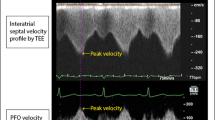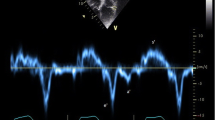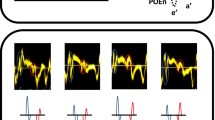Abstract
Objectives
The value of conventional non-invasive Doppler parameters to predict ventricular end-diastolic pressure (EDP) and diastolic function in congenital heart diseases is limited. The aim of our prospective study was to investigate whether the ratio of mitral early blood inflow velocity to early diastolic velocity of the mitral annulus (E/e′) as assessed by pulsed tissue Doppler is related to EDP in patients with different congenital heart disease (CHD) undergoing left heart catheterization.
Methods
A total of 115 hospital inpatients (64 male) with different CHD referred for cardiac catheterization were simultaneously examined by echocardiography for non-invasive estimation of ventricular EDP during heart catheterization. The mean age at catheterization was 8.71 years (range 3 days to 18 years). These patients were divided into two groups according to the different hemodynamic and morphology conditions: group A consisted of patients with biventricular heart and group B of patients with univentricular heart.
Results
For all the studied patients, a significant positive correlation was found between E/e′ and EDP (r = 0.54, P < 0.001). EDP correlated rather weakly with combined measurements E/global LV early diastolic velocity (r = 0.27, P = 0.02). A significant relationship was also found between ventricular EDP and early mitral inflow velocity E (r = 0.36, P = 0.001). The ratio of pulmonary venous flow velocities s/d was not found to be related to invasively measured EDP (r = −0.16, P = 0.13). Group A (n = 96) had similar results, but for group B (n = 19), these parameters did not show a relationship to EDP. The analysis of these parameters showed that the larger area under the curve (AUC) was found for the ratio of E/e′ (AUC = 0.77) compared with E/global e′ (AUC = 0.57). E/e′ > 10.7 had 69 % sensitivity and 81 % specificity for EDP > 10 mmHg.
Conclusion
Doppler and tissue Doppler-derived E/e′ ratio is related to simultaneous invasive measurement of EDP in a heterogeneous group of patients with CHD and may provide an additional surrogate non-invasive estimation of ventricular diastolic performance in the routine follow-up of these patients.



Similar content being viewed by others
References
Nishimura RA, Tajik AJ (1997) Evaluation of diastolic filling of left ventricle in health and disease: Doppler echocardiography is the clinician’s Rosetta stone. J Am Coll Cardiol 30:8–18
Brunazzi MC, Chirillo F, Pasqualini M et al (1994) Estimation of left ventricular diastolic pressures from precordial pulsed-Doppler analysis of pulmonary venous and mitral flow. Am Heart J 128:293–300
Yamamoto K, Nishimura RA, Burnett JC Jr et al (1997) Assessment of left ventricular end-diastolic pressure by Doppler echocardiography: contribution of duration of pulmonary venous versus mitral flow velocity curves at atrial contraction. J Am Soc Echocardiogr 10:52–59
Steen T, Rootwelt K, Risoe C et al (1995) A new color M-mode index of diastolic filling compared with radionuclide ventriculography. Int J Cardiol 48:89–95
Hurrell DG, Nishimura RA, Ilstrup DM et al (1997) Utility of preload alteration in assessment of left ventricular filling pressure by Doppler echocardiography: a simultaneous catheterization and Doppler echocardiographic study. J Am Coll Cardiol 30:459–467
Ommen SR, Nishimura RA, Appleton CP, Miller FA, Oh JK, Redfield MM, Tajik AJ (2000) Clinical utility of Doppler echocardiography and tissue Doppler imaging in the estimation of left ventricular filling pressures: a comparative simultaneous Doppler-catheterization study. Circulation 102(15):1788–1794
Nagueh SF, Sun H, Kopelen HA, Middleton KJ, Khoury DS (2001) Hemodynamic determinants of the mitral annulus diastolic velocities by tissue Doppler. J Am Coll Cardiol 37(1):278–285
Dokainish H, Sengupta R, Pillai M, Bobek J, Lakkis N (2008) Usefulness of new diastolic strain and strain rate indexes for the estimation of left ventricular filling pressure. Am J Cardiol 101(10):1504–1509
Moller JE, Sondergaard E, Poulsen SH et al (2001) Color M-mode and pulsed wave tissue Doppler echocardiography: powerful predictors of cardiac events after first myocardial infarction. J Am Soc Echocardiogr 14:757–763
Wang M, Yip GW, Wang AY et al (2003) Peak early diastolic mitral annulus velocity by tissue Doppler imaging adds independent and incremental prognostic value. J Am Coll Cardiol 41:820–826
Paraskevaidis IA, Panou F, Papadopoulos C, Farmakis D, Parissis J, Ikonomidis I, Rigopoulos A, Iliodromitis EK, Th Kremastinos D (2009) Evaluation of left atrial longitudinal function in patients with hypertrophic cardiomyopathy: a tissue Doppler imaging and two-dimensional strain study. Heart 95(6):483–489
Cho GY, Marwick TH, Kim HS, Kim MK, Hong KS, Oh DJ (2009) Global 2-dimensional strain as a new prognosticator in patients with heart failure. J Am Coll Cardiol 54(7):618–624
Sun JP, Stewart WJ, Yang XS, Donnell RO, Leon AR, Felner JM, Thomas JD, Merlino JD (2009) Differentiation of hypertrophic cardiomyopathy and cardiac amyloidosis from other causes of ventricular wall thickening by two-dimensional strain imaging echocardiography. Am J Cardiol 103(3):411–415
Dokainish H, Sengupta R, Pillai M, Bobek J, Lakkis N (2008) Assessment of left ventricular systolic function using echocardiography in patients with preserved ejection fraction and elevated diastolic pressures. Am J Cardiol 101(12):1766–1771
Choong CY, Herrmann HC, Weyman AE et al (1987) Preload dependence of Doppler-derived indexes of left ventricular diastolic function in humans. J Am Coll Cardiol 10:800–808
Eriksson SV, Bjorkander I, Held C et al (1996) Age and gender differences in left ventricular function among patients with stable angina and a matched control group: a report from the Angina Prognosis Study in Stockholm. Cardiology 87:287–293
Rihal CS, Nishimura RA, Hatle LK et al (1994) Systolic and diastolic dysfunction in patients with clinical diagnosis of dilated cardiomyopathy: relation to symptoms and prognosis. Circulation 90:2772–2779
Temporelli PL, Corra U, Imparato A et al (1998) Reversible restrictive left ventricular diastolic filling with optimized oral therapy predicts a more favorable prognosis in patients with chronic heart failure. J Am Coll Cardiol 31:1591–1597
Yamamoto K, Nishimura RA, Chaliki HP et al (1997) Determination of left ventricular filling pressure by Doppler echocardiography in patients with coronary artery disease: critical role of left ventricular systolic function. J Am Coll Cardiol 30:1819–1826
Oh JK, Appleton CP, Hatle LK et al (1997) The noninvasive assessment of left ventricular diastolic function with two-dimensional and Doppler echocardiography. J Am Soc Echocardiogr 10:246–270
Nishimura RA, Appleton CP, Redfield MM et al (1996) Noninvasive Doppler echocardiographic evaluation of left ventricular filling pressures in patients with cardiomyopathies: a simultaneous Doppler echocardiographic and cardiac catheterization study. J Am Coll Cardiol 28:1226–1233
Nishimura RA, Appleton CP, Redfield MM, Ilstrup DM, Holmes DR Jr, Tajik AJ (1996) Noninvasive Doppler echocardiographic evaluation of left ventricular filling pressures in patients with cardiomyopathies: a simultaneous Doppler echocardiographic and cardiac catheterization study. J Am Coll Cardiol 28:1226–1233
Voigt JU, Arnold MF, Karlsson M et al (2000) Assessment of regional longitudinal myocardial strain rate derived from Doppler myocardial imaging indexes in normal and infarcted myocardium. J Am Soc Echocardiogr 13:588–598
Aranda JM Jr, Weston MW, Puleo JA et al (1998) Effect of loading conditions on myocardial relaxation velocities determined by Doppler tissue imaging in heart transplant recipients. J Heart Lung Transplant 17:693–697
Sohn DW, Chai IH, Lee DJ et al (1997) Assessment of mitral annulus velocity by Doppler tissue imaging in the evaluation of left ventricular diastolic function. J Am Coll Cardiol 30:474–480
Gulati VK, Katz WE, Follansbee WP et al (1996) Mitral annular descent velocity by tissue Doppler echocardiography as an index of global left ventricular function. Am J Cardiol 77:979–984
Nagueh SF, Middleton KJ, Kopelen HA, Zoghbi WA, Quinones MA (1997) Doppler tissue imaging: a noninvasive technique for evaluation of left ventricular relaxation and estimation of filling pressures. J Am Coll Cardiol 30:1527–1533
Nagueh SF, Mikati I, Kopelen HA et al (1998) Doppler estimation of left ventricular filling pressure in sinus tachycardia: a new application of tissue Doppler imaging. Circulation 98:1644–1650
Nagueh SF, Lakkis NM, Middleton KJ et al (1999) Doppler estimation of left ventricular filling pressures in patients with hypertrophic cardiomyopathy. Circulation 99:254–261
Hirata K et al (2009) Usefulness of a combination of systolic function by left ventricular ejection fraction and diastolic function by E/E/E’ to predict prognosis in patients with heart failure. Am J Cardiol 103:1275–1279
Hillis GS, Moller JE, Pellikka PA, Gersh BJ, Wright RS, Ommen SR, Reeder GS, Oh JK (2004) Noninvasive estimation of left ventricular filling pressure by E/E’ is a powerful predictor of survival after acute myocardial infarction. J Am Coll Cardiol 43:360–367
Acknowledgments
Ms. Yaping Mi is research fellow of the Deutsche Akademischer Austauch Dienst (DAAD), Bonn. This work was supported by the Kompetenznetz Angeborene Herzfehler (Competence Network for Congenital Heart Defects) funded by the Federal Ministry of Education and Research (BMBF), FKZ 01G10210. We thank Anne M. Gale for editorial assistance.
Author information
Authors and Affiliations
Corresponding author
Rights and permissions
About this article
Cite this article
Mi, Y.P., Abdul-Khaliq, H. The pulsed Doppler and tissue Doppler-derived septal E/e′ ratio is significantly related to invasive measurement of ventricular end-diastolic pressure in biventricular rather than univentricular physiology in patients with congenital heart disease. Clin Res Cardiol 102, 563–570 (2013). https://doi.org/10.1007/s00392-013-0567-0
Received:
Accepted:
Published:
Issue Date:
DOI: https://doi.org/10.1007/s00392-013-0567-0




